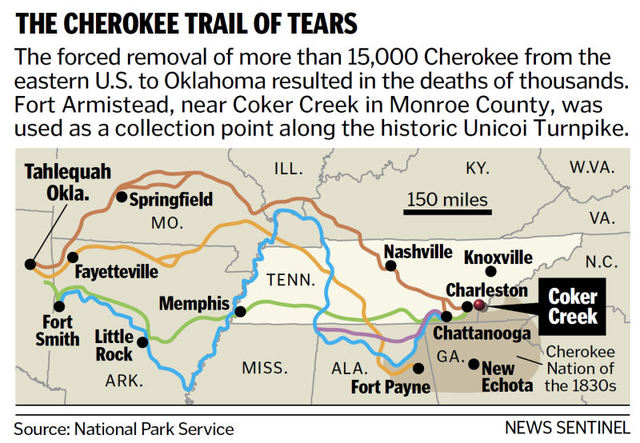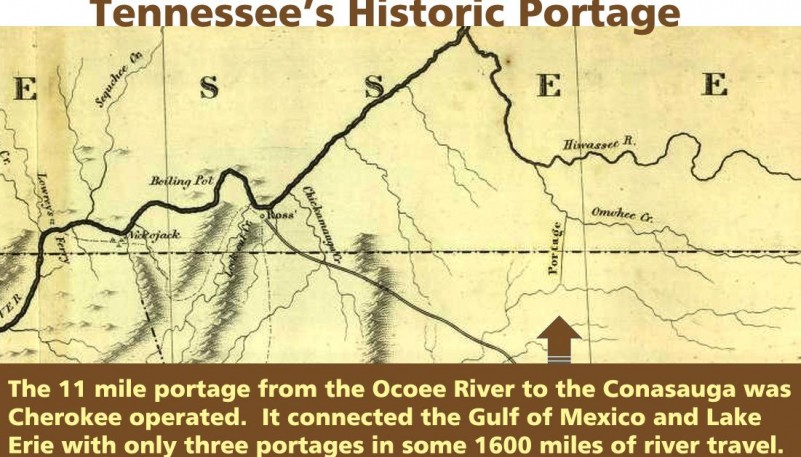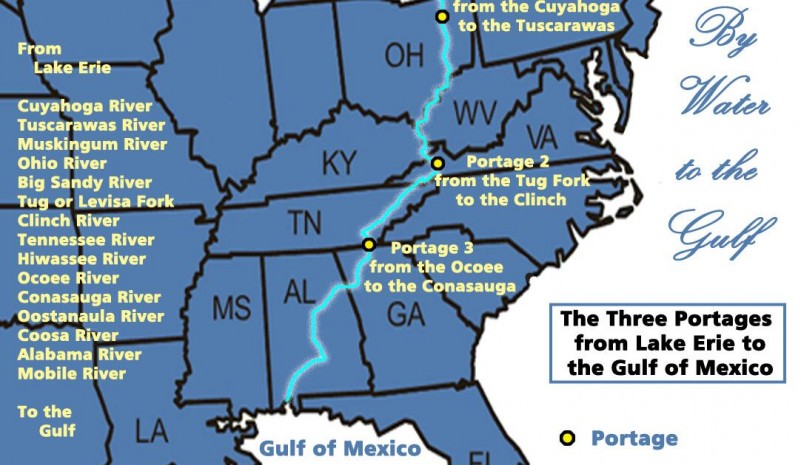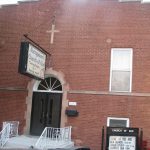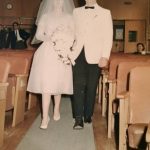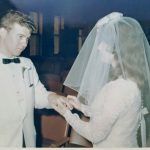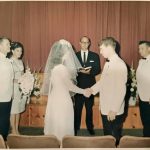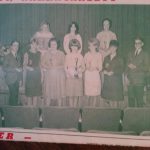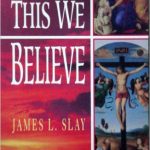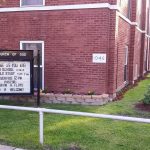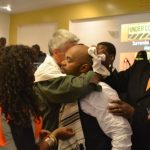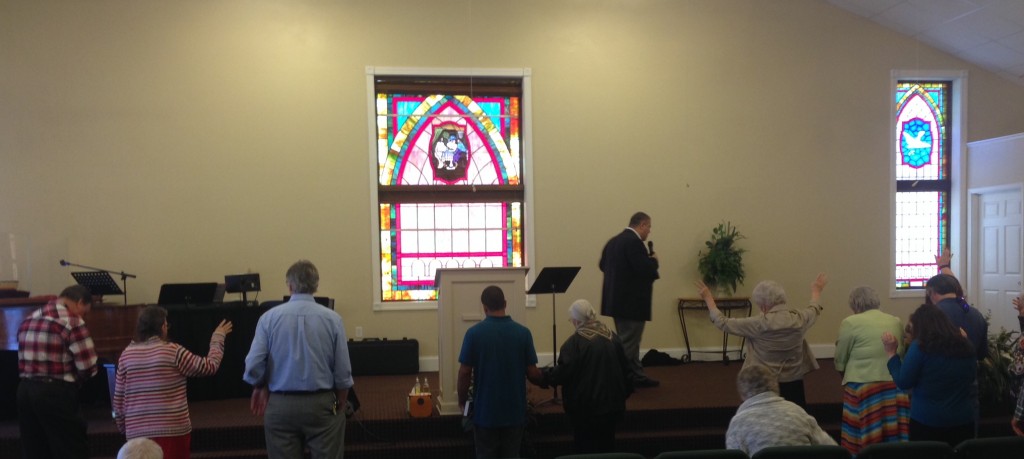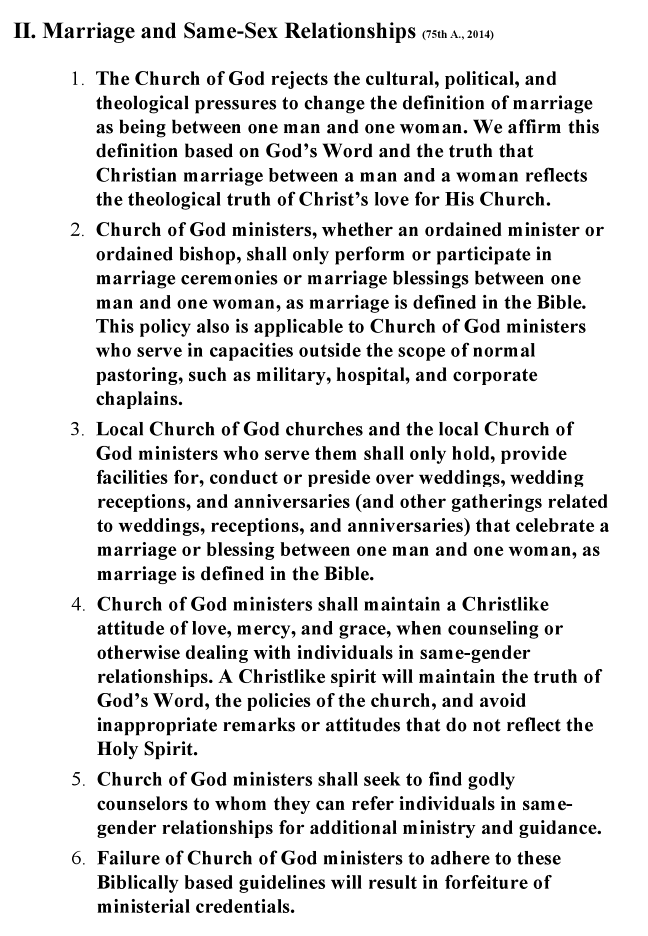Ocoee Church of God Celebrates 40 Years
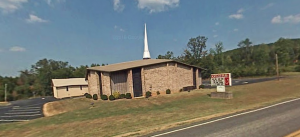 Historical Significance of the Tennessee/Georgia Old Federal Road in the Trail of Tears and its Connection to the Church of God
Historical Significance of the Tennessee/Georgia Old Federal Road in the Trail of Tears and its Connection to the Church of God
New Echota, Georgia was the capital of the Cherokee Nation from 1825 to 1838. This is the location where the Treaty of New Echota or the Treaty of 1835 was signed on December 29, 1835 by U.S. government officials and representatives of a minority Cherokee political faction called “The Treaty Party” or “Ridge Party”. This treaty was not approved by the Cherokee National Council nor signed by Principal Chief John Ross. Regardless, it established terms under which the Cherokee Nation were to receive a sum not exceeding five millions dollars for surrendering their lands and possessions east of the Mississippi river to the U.S. Government and agreeing to move to the Indian Territory west of the Mississippi River, which later became part of Oklahoma.
The Red Clay State Historic Park, located 17 miles southwest of the Church of God Headquarter in Cleveland, Tennessee, marks the last location of the Cherokee councils where Chief John Ross and nearly 15,000 Cherokees rejected the proposed Treaty of 1835. Despite the questionable legitimacy of this Treaty, in March 1838, it was amended and ratified by the U.S. Senate and became the legal basis for the forcible removal of the Cherokee Nation known as the Trail of Tears. The name came from the Cherokees who called the removal “Nunna-da-ul-tsun-yi,” which means “the place where they cried.” The last pieces of land controlled by the Cherokee Nation at that time were North Georgia, Northern Alabama and parts of Tennessee and North Carolina. The forced journey was through three major land routes. Each route could have taken some 1,000 miles and over four months to walk. The removal of the Cherokees and other tribes from their homelands in the Southeast began May 16, 1838.
The Georgia Road or present day Federal Road was a route of the Trail of Tears that the Cherokee people walked during their forced removal from their homelands. The route was built from 1803 to 1805 through the newly formed Cherokee Nation on a land concession secured with the 1805 Treaty of Tellico with the agreement that the U.S. Government would pay the Cherokee Nation $1,600.00. The Treaty was signed on October 25, 1805 at The Tellico Blockhouse (1794 – 1807) – an early American outpost located along the Little Tennessee River in Vonore, Monroe County, Tennessee that functioned as the location of official liaisons between the United States government and the Cherokee. The route was originally purposed to be a mail route because of the great need to link the expanding settlements during the westward expansion of the U.S. colonies. It was in 1819 after improvements to the road that it was called “the Federal Road”.
The Tellico Blockhouse was the starting point for the Old Federal Road, which connected Knoxville to Cherokee settlements in Georgia. The route ran from Niles Ferry on the Little Tennessee River near the present day U.S. Highway 411 Bridge, southward into Georgia. Starting from the Niles Ferry Crossing of the Little Tennessee River, near the U.S. Highway 411 bridge, the road went straight to a point about two miles east of the present town of Madisonville, Tennessee. This location is 20 some miles north of the Tellico Plains area that marks the site of the beginning of the Church Cleveland, Tennessee. The road continued southward via the Federal Trail connecting to the North Old Tellico Highway past the present site of Coltharp School, intersected Tennessee Highway 68 for a short distance and passed the site of the Nonaberg Church. East of Englewood, Tennessee it continued on the east side of McMinn Central High School and crossed Highway 411 near the railroad overpass. Along the west side of Etowah, the road continued near Cog Hill and the Hiwassee River near the mouth of Conasauga Creek where there was a ferry near the site of the John Hildebrand Mill. From the ferry on the Hiwassee River the road ran through the site of the present Benton, Tennessee courthouse. It continued on Welcome Valley Road and then crossed the Ocoee River at the Hildebrand Landing. From this point the road ran south and crossed U.S. Highway 64 where there is now the River Hills Church of God formerly the Ocoee Church of God. Continuing south near Old Fort, the route crossed U.S. Highway 411 and came to the Conasauga River at McNair Landing. Near the south end of the village of Tennga, Georgia is an historic marker alongside of Highway 411m which states the Old Federal Road was close to its path for the next twenty-five miles southward. It would have been at this point in Tennga that the Trail of Tears would have taken a turn onto GA-2 passing the Praters Mill near Dalton Georgia to connect in Chattanooga, Tennessee.
Out of the 15,000 Cherokee who endured the forced migration west after the Treaty of 1835, it is estimated that several thousand died along the way or in internment holding camps. This Old Federal route is where some of Cherokee holding camps would have been located. The Fort Marr or Fort Marrow military post constructed around 1814 under the 1803 Treaty, is the last visible remains of these camps. The original fort was built on the Old Federal Road near the Tennessee/Georgia state line near the Conasauga River. It was relocated in 1965 beside U.S. Hwy. 411 in Benton and then to it’s current location in the Cherokee National Forest on the grounds of the Hiwassee/Ocoee State Park Ranger Station at Gee Creek Campground in Delano, Tennessee. This location provides access to popular Church of God water baptismal sites. In June 4, 1838 Captain Marrow reported having 256 Cherokees at his fort ready for emigration.
The Native Americans were forcefully removed from their homes, plantations and farms all because of greed. Thousands of people lost their lives including the wife of Chief John Ross. Parts of the Old Federal Road have been washed away with floods of tears, but there are parts that still remain. The Church of God, having its roots in the same territory of the Cherokee, Chickamauga, Muskogee Creek, Choctaw and Chickasaw people, plays a vital role in the process of reconciliation among the descendants of the Trail of Tears. And the historical buildings and markers along the Trail or Tears must be preserved. The churches along the route even though they were not actual structures during the time period are a historical beacon of hope which still crying out for those lost on this tragic journey.
Famous boatyards near Benton, Tennessee and nearby Spring Place, Georgia were operated by the Cherokee Hildebrand and McNair families respectively. These were opposite ends of a portage of very long importance in eastern North America. The eleven mile canoe portage or, latter, a wagon transport portage, between the upper reaches of the Ocoee River in Tennessee and the Conasauga River in Georgia, provided one of the most significant “shortcuts” in the East.
Chicago’s Narragansett Church of God, Rev. James L. Slay and the 1948 Church of God Declaration of Faith
October 25, 2016 by Cup&Cross
Filed under Featured, News, Publication
Rev. James Slay of the Narragansett Church of God in Chicago was commissioned to write the book entitled, THIS WE BELIEVE in connection to the 1948 Church of God Declaration of Faith. During the forties, you could see him driving around Cleveland in a white and green Packard. His hair was much longer then and somewhat wavy. Later, he was heard preaching a sermon at the Narragansett Church of God in Chicago a sermon titled: “God setteth the door ajar and flings it wide open when necessary.”
On August 30, 1948, the Church of God General Assembly adopted the Church of God Declaration of Faith. Rev. James L. Slay was the chair of the committee that drafted the 14 item statement. Along with its adoption, the Assembly also recommended: “That the same Articles of Faith Committee, consisting of James L. Slay, Earl P. Paulk, Glenn C. Pettyjohn, J.L. Goins, J.A. Cross, Paul H. Walker, R.P. Johnson, E.M. Ellis, and R.C. Muncy, prepare a full document of the ‘Articles of Faith of the Church of God,’ to be presented for acceptance at the next General Assembly of the Church of God.” Despite the General Assembly recommendation, the Declaration of Faith has not been modified since its adoption in 1948.
Ministering at the Regional Church of God Exactly Nine Months before the Massive Youth Revival in the Schools of Delbarton, West Virginia
Click on the text-link to watch our message while ministering at the Regional Church of God exactly 9 months before the Massive Youth Revival in the Schools of Delbarton, West Virginia | http://www.ustream.tv/recorded/69822047
Church of God Chaplaincy in Bulgaria: In the beginning…
 Bulgarian Chaplaincy Association: Celebrating a Decade of Ministry
Bulgarian Chaplaincy Association: Celebrating a Decade of Ministry
We are proud to announce that the Master’s of Chaplaincy Ministry Program, we designed and launched in Bulgaria in 2006, has been selected to be part of the Social Service Program of New Bulgarian University. After being for years a valuable part of the regular curriculum of the Bulgarian Evangelical Theological Institute and the St. Trivelius Institute in the capital Sofia, the chaplaincy program has received the highest level of recognition as successful graduates will be finally able to receive government recognized degrees and apply their knowledge and training in chaplaincy on a professional level. The chaplaincy program can also serve within the Integration Proposal of local NATO programs and be instrumental in dealing with the enormous wave of Middle East migrants crossing through Bulgaria today.
But let us backup just a moment and start from the very beginning. In the summer of 1995, while pioneering the first Bulgarian church in the Chicago Metro, the local Church of God state office offered a civil chaplaincy training course for beginners. Unfortunately, due to our heavy church schedule, the chance to attend was low and virtually unobtainable. It was not until five years later that our interest in the field was finally rewarded, as in the summer of 2000 both my wife-to-be and I completed the required course work for chaplaincy accreditation, followed by an intense module at the Erlanger Hospital in Chattanooga, where essentially the whole idea for the resurrection of chaplaincy ministry in Bulgaria was born.
Today, our Master’s of Chaplaincy Ministry Program has produced a number of graduates who are serving in various chaplaincy positions and civil services in Bulgaria. Please continue to pray for all our named and unnamed chaplains on mission. (Click here to read more)
Also important [click to read]:
- U.S. Department of State recognizes our chaplaincy efforts in Bulgaria
- Bulgarian Chaplaincy Association: Integration Proposal with Local NATO Programs
- Bulgarian Chaplaincy Association: Vision and Resolution
- Chronology of our role and involvement in developing Church of God chaplaincy in Bulgaria since 2001
- Master’s of Chaplaincy Ministry Program in Bulgaria Reflections
- The Past Decade of Chaplaincy in Bulgaria (2006-2016)
- Related Publications and Presentations by Cup & Cross Ministries International
Ministering at Regional Church of God in Delbarton, WV
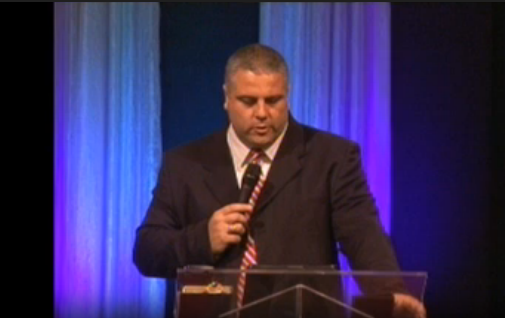
At Bread of Life Church of God in Byron, GA
The Church of God: A social history
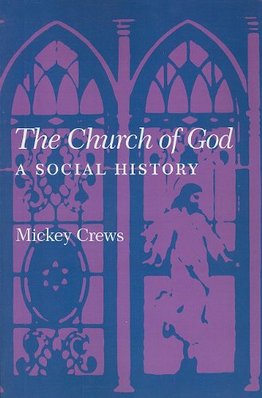 The Church of God: A SOCIAL HISTORY
The Church of God: A SOCIAL HISTORY
by Mickey Crews
The University of Tennessee Press, KNOXVILLE
Copyright © 1990 by The University of Tennessee Press / Knoxville. All Rights Reserved. Manufactured in the United States of America. First Edition.
The paper in this book meets the minimum requirements of the American National Standard for Permanence of Paper for Printed Library Materials.
READ the full text here: https://archive.org/details/churchofgodsociacrew
DOWNLOAD as PDF file here: https://archive.org/download/churchofgodsociacrew/churchofgodsociacrew.pdf
First person to speak in tongues in the Assemblies of God was William Jethro Walthall of the Holiness Baptist Churches of Southwestern Arkansas
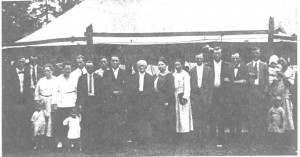 By Glenn Gohr
By Glenn Gohr
A/G Heritage, Fall 1992
Although the modern Pentecostal movement relates its beginnings to Charles Parham, who formulated classical Pentecostal theology at his Bible school in Topeka at the turn of the century, throughout history, from apostolic times to the present, there have been certain religious groups and isolated cases of individuals who have experienced tongues-speaking and spiritual gifts.
William Jethro Walthall, who founded the Holiness Baptist Churches of Southwestern Arkansas, a group which later merged with the Assemblies of God, is an important figure who received his baptism in the Spirit prior to Parham’s launching of Pentecostalism in 1901.
Walthall’s Spirit baptism, which occurred 113 years ago, is one of the earliest documented cases of speaking in tongues in North America. Earlier instances of tongues-speaking have been reported among the Shakers, the Holiness Movement, the “Gift People” or “Gift Adventists” in New England, and others. It is very possible that Walthall is the earliest person to have received the baptism in the Holy Spirit and who later joined the Assemblies of God.
William Jethro Walthall was born in Nevada County, Arkansas, March 9, 1858, the son of Charles Featherston Walthall and Mary Jemima Meador. His father died in 1863 at Rock Island, Illinois, as a prisoner in the Civil War, and his mother died 2 years later. Orphaned at age 7, he was reared by his widowed grandmother. However he had no Christian upbringing, so it was not until 1877 that he was confronted with the claims of the Gospel. That happened when he attended an old-time Methodist meeting and conviction gripped his heart, resulting in his conversion at age 19. Two years later, on August 3, 1879, he was married to his first wife, Melissa P. “Missy” Beavers, who bore him two children, Millard and Ibber Mae. After Melissa passed away, he married Hattie Vaughn on March 24, 1915.
While a young Christian, Walthall had a yearning for more of the workings of God in his life. He earnestly began to seek for a fullness of power to witness and better serve the Lord. This spiritual hunger led him to carefully study the Book of Acts and other scriptures. There he found recorded an enduement with power of the Holy Ghost which had accompanied the Early Church. He wanted this same experience in his life.
During a season of fervent prayer, he received a mighty infilling of the Spirit on September 3, 1879. Since he had never heard of the baptism of the Holy Spirit, he did not receive his Baptism through any prescribed theory or method.
Until that time all he knew about the Holy Spirit came from the teachings of the Methodists and Baptists. But this was something new. His experience came about in answer to prayer and through his own study of the Word of God. From the outset he understood that his experience corresponded with the records given in the Book of Acts.
In his testimony, Walthall describes his infilling by saying, “I was carried out of myself for the time being.” From the time of his Baptism, he testified that he often felt the strong anointing power of God. At times he would fall under the power of God when the Spirit came upon him. He also spoke in tongues as the Spirit directed.
For two years, during which time the Holy Ghost would often fall on me, I walked with God. Sometimes while in service and sometimes when alone in prayer I would fall prostrate under His mighty power. While under this power my tongue seemed to be tied in the center and loosed at both ends. I knew nothing of the Bible teaching on the Baptism or speaking with tongues, and thought nothing of what had happened in my experience.
Walthall was ordained by the Missionary Baptist Church on May 29, 1887, and served several congregations in Southwest Arkansas. He was active in various associational committees including foreign missions and temperance. In 1891 he was pastor of Piney Grove Church at Boughton, Arkansas, which was a part of the Red River Baptist Association of the Southern Baptist Convention. In fact, the annual associational meeting was held that year at Walthall’s church. The next year he was pastoring two churches at Bluff City and Prescott. From 1894-1895 he was pastoring at Stephens. The last Baptist church he pastored was at Buena Vista. Because of the prevalent view of the Holy Spirit held by Baptists, Methodists, and other mainline churches, Walthall had some reservations about his experience, as he shares in his testimony:
The ordinary Methodist and Baptist teaching was all that I knew, and, of course, that served to diminish my experience and to paralyze my faith rather than build me up. In the meantime, I began preaching a work to which I was called when the blessed Spirit filled me. I always felt that there was a lost chord in the Gospel ministry. My own ministry never measured up to my ideal, nor did the teaching of my church (Baptist) measure up to my experience.
Then in 1895 Walthall came into contact with the Holiness revival. Its emphasis on the work of the Holy Spirit impressed him. Its teachings approximated his ideal more nearly than anything else, but he never fully ascribed to the Holiness theology. He could not accept its theory of sanctification; nor could he accept its abridgement of the supernatural. Even so, the Holiness revival opened him up to a larger sphere of ministry, This in turn gave him the encouragement he needed to preach the full gospel message as he understood it from the Scriptures. As he began to preach a full gospel message, the Baptist leaders excluded him from his church and he was ostracized from the Baptist ministry in 1896. He continued preaching on his own.
After my new vision of the Word of truth, and my expulsion from the Baptist fellowship and ministry, I went alone with a new zeal in an independent, plodding ministry, with church and school houses closed against me. I was looked upon with suspicion, as unbalanced but was so animated by the divine presence that it seemed at times as if terrestrial bearing was almost lost. Baptist minister, J. C, Kelly, and other Baptists who became disfellowshipped because of their beliefs in entire sanctification and the work of the Holy Spirit.
He was soon followed by another Baptist minister, J. C. Kelly, and other Baptists who became disfellowshipped because of their beliefs in entire sanctification and the work of the Holy Spirit.
8 Things Christian Believers and Churches Can Do in Light of Recent SCOTUS Ruling on LGBT
1. State Level
- Contact your congressman/senator for available options. Write your governor without hesitation
- Texas Governor Greg Abbott signed a bill allowing clergy to refuse to officiate same sex ceremonies
- Texas Attorney General fights back against Supreme Court
- First Amendment Defense Act Sen. Mike Lee of Utah introduced
2. Personal Level
- Inform yourself and your family of the clear Biblical principles for love and holiness applicable in this situation
- Pray daily for the protection of your family and the salvation of many souls
- Be faithful to your husband/wife and children
3. Corporate Level
- Hold on to your Christian standards for doing business
- Support other Christian businesses
- Forgive and forget, but watch and pray
4. Local Church Level
- Join in corporate fasting and praying in the Spirit
- Uphold the Biblical standard of holy living
- Preach the truth as you have received it
- Adopt local church resolutions on the sanctity of the family
5. Denominational Level
- Adopt resolutions on the sanctity of the family applicable to all your churches internationally (not just North America)
- Adopt resolutions on same-sex marriages, transgender, abortions and all similar issues applicable to all your churches internationally (not just North America)
- Stand along members, ministers, local congregations and Christian schools under attack for upholding the Biblical standard of holy living
6. Christian Alliances Level
- Stay informed of all legal protests and options
- Learn about upcoming IRS changes and alternative exempt options
- Consult with legal council about your rights and obligations under the law
- Join with other Christians in legal measures for upholding the Biblical standard of holy living
7. International Organizational Level
- Beware of what Christian churches are doing internationally to protect their members, ministers, local congregations and Christian schools
- Examine your current tax status and consult your CPA, attorney and insurance agents about the various possibilities to protect your church and ministry
- 2015 ANGLICAN CHURCH Communique
- Methodist church Faces Schism Over Same-Sex Marriage
8. Get good insurance with adequate coverage and experience in the matter
• A good example from Brotherhood Mutual Ins.
READ ALSO:
- Statement of the Church of God Regarding Same-Sex Marriage Court Decision
- AFA: 3 things your church must do immediately to protect itself
- Church of God Instructions for Ministers: Marriage and Same-sex Relationship (75th A., 2014)
- SOUTHERN BAPTIST ADF PLAN TO RESIST ANTI-DISCRIMINATION LAWS
- Web-cached copy of ADF PLAN TO RESIST ANTI-DISCRIMINATION LAWS
- Brotherhood Mutual Ins: What should churches and ministries know?
- 6 More Things To Do after the Supreme Court Decision on Gay Marriage
- Why the church should neither cave nor panic?
- How Will the U.S. Supreme Court’s Same-Sex-Marriage Decision Affect Religious Liberty?
- Why Evangelical Churches Need to Address the New Reality?
- Will High-court ruling affect church weddings?
Church of God Instructions for Ministers: Marriage and Same-sex Relationship (75th A., 2014)
Church of God Instructions for Ministers: Marriage and Same-sex Relationship (75th A., 2014)
p. 158-159, S63. GENERAL INSTRUCTIONS FOR MINISTERS, by adding the following so as to read:
II. Marriage and Same-Sex Relationships
A. The Church of God rejects the cultural, political, and theological pressures to change the definition of marriage as being between one man and one woman. We affirm this definition based on God’s Word and the truth that Christian marriage between a man and a woman reflects the theological truth of Christ’s love for His Church.
B. Church of God ministers, whether an ordained minister or ordained bishop, shall only perform or participate in marriage ceremonies or marriage blessings between one man and one woman, as marriage is defined in the Bible. This policy also is applicable to Church of God ministers who serve in capacities outside the scope of normal pastoring, such as military, hospital, and corporate chaplains.
C. Local Church of God churches and the local Church of God ministers who serve them shall only hold, provide facilities for, conduct or preside over weddings, wedding receptions, and anniversaries (and other gatherings related to weddings, receptions, and anniversaries) that celebrate a marriage or blessing between one man and one woman, as marriage is defined in the Bible.
D. Church of God ministers shall maintain a Christ-like attitude of love, mercy, and grace, when counseling or otherwise dealing with individuals in same-gender relationships. A Christ-like spirit will maintain the truth of God’s Word, the policies of the church, and avoid inappropriate remarks or attitudes that do not reflect the Holy Spirit.
E. Church of God ministers shall seek to find godly counselors to whom they can refer individuals in same-gender relationships for additional ministry and guidance.
F. Failure of Church of God ministers to adhere to these biblically based guidelines will result in forfeiture of ministerial credentials.


